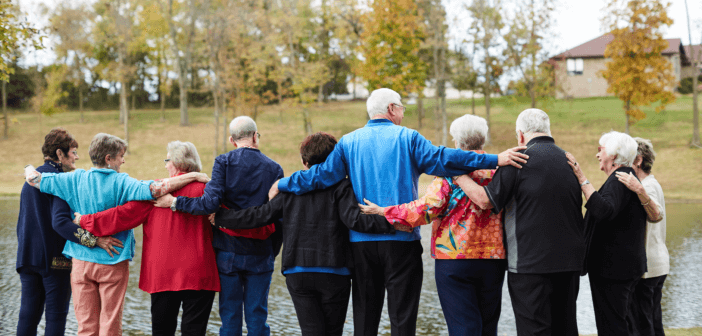Karl Vaters highlights the importance of building a strong, vibrant congregation of seniors with intentionality, training, and a focus on the future. He emphasizes the potential impact seniors can make in the ministries of the church and the need to be intentional about engaging seniors in the life of the congregation.
Everyone in church leadership seems to be talking about how to reach NextGen, but what do you do when your church is filled with seniors? Is there a way to build a strong church with them? Or does it always have to be about younger people? I hear those questions a lot. And I’m learning some great lessons in the conversations that follow. The answer is yes. You can build a strong church by focusing on seniors.
Here are five principles I’ve learned about building a strong, healthy church with a congregation whose hair is more gray than high on top.
1. Do it on purpose.
Senior ministry must be as intentional as every other ministry. A church that’s filled with seniors because they’re the only ones left from the bygone glory days is not healthy. But a church filled with seniors because it’s intentionally ministering to their needs and utilizing their gifts can be very healthy, strong, and a blessing to their community.
Right now, your church may be graying unintentionally. But maybe that’s what you’re gifted at and called to do. If so, don’t fight it, lean into it. If you’re already doing it by default, imagine how well you could do it on purpose.
2. Train, don’t just teach.
Most of today’s seniors were raised in an era in which we outsourced ministry instead of doing it ourselves. Other than ushering, teaching Sunday School, or singing in the choir, the average churchgoer in the 1950s-90s put their money in the offering so that others would do ministry for us. We paid our pastor to visit the sick, we paid missionaries to go to foreign lands, and so on. And on Sunday, we paid to hear great teaching.
It’s time to shift that into a higher gear. Great teaching isn’t enough anymore. If it ever was. You can hear a fantastic sermon and go home impressed, but unchanged by it. Teaching and preaching churches need to become discipling and training churches. This applies as much to senior believers as it does to younger believers.
Older Christians have a lot to contribute — and not just financially. But they’ll never step into their ministry gifting unless we expect it from them and equip them for it. According to the late writer and Christian teacher, James Houston, “Our society is doing a good job of producing seniors but not elders.” Training is what makes the difference between just getting older and becoming an elder.
3. Send them, don’t just tend them.
Seniors may not have the physical stamina to do some tasks anymore. But they often have more time, finances, and wisdom than their younger counterparts. Yes, in a church filled with seniors, there will be more need for hands-on pastoral care. But that pastoral care should be distributed among the rest of the church body. Caring for each other, not expecting paid clergy to do it all.
Valuing senior believers doesn’t just mean doing ministry for them, it means doing ministry with them. Sure, the church can still take a bus trip to Branson, Missouri. But when they get home, they can and should be activated into vibrant, life-giving ministry. There’s no excuse for a church filled with passive Christian seniors any more than there’s an excuse for a church filled with passive Christian youth.
4. Keep a forward focus.
The seniors who have been the backbone of your church are different than the seniors who are coming next. Grandma went to Woodstock. She’s more likely to have hidden a copy of Rolling Stone from her parents than to have displayed the Saturday Evening Post on the coffee table. This upcoming era of seniors (my era) won’t want the same things from church that my parents’ era wanted. And we won’t contribute to ministry in the same way, either.
A church that ministers to younger people needs to anticipate the needs of the next generation. A church that wants to stay strong while ministering to seniors needs to do the same thing. Look at least a decade ahead. Start asking how the 50-somethings of today might want to participate in the life of the church differently as they start graying. The Jesus People of the ‘60s and ‘70s changed the way younger churches did ministry then. And they’ll change the way older churches do ministry in the future.
5. Find new ways to reach and keep them
Just because a church is predominantly ministering to and with senior adults doesn’t exempt it from the Great Commission. A vibrant older congregation needs to reach out to the older folks in their community, not just caring for the ones they’ve got (although that should certainly be done, too). But the next generation of seniors will have far less interest in church traditions than the current one. Many of today’s mature adults have never attended church. Some never had a praying parent or grandparent.
So, the tools we relied on to reach and keep previous generations of older adults won’t work on the next ones. We’re going to have to think differently. The pace of change will be slower that it is for a church that’s ministering to young people, but it will be just as relentless.
The vital older church
Intentionally ministering to and with an older congregation does not have to mean the church is dying. It can be vital and valuable and make great contributions to the kingdom of God. But it won’t look like it used to look. And it won’t happen by mistake.
This article was originally shared on May 15, 2023 at KarlVaters.com and is shared with permission.
Related Resources
- Discipling People in Midlife and Beyond by Michelle Van Loon
- Is the Church Ignoring the Spiritual Needs of Adults in Midlife featuring Michelle Van Loon — Leading Ideas Talks podcast episode | Podcast transcript
- Why Making Your Church Multigenerational Is Worth the Effort by Chuck Lawless






